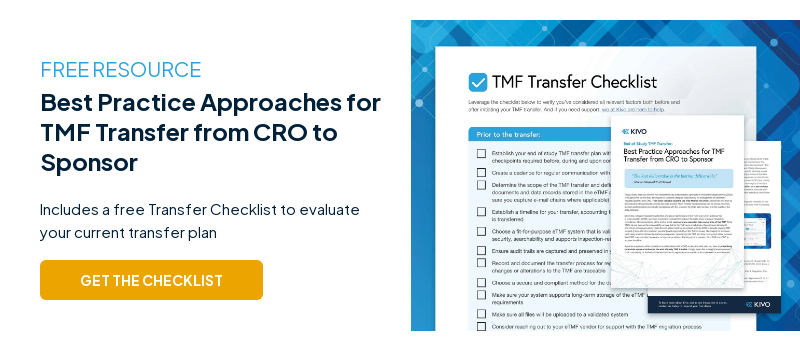Throughout the clinical trial, the majority of sponsors delegate responsibility for management of their most valuable asset to their CRO. That most valuable asset is the Trial Master File (TMF), defined by the EMA as the collection of essential documents and data records which “enable the operational staff as well as monitors, auditors and inspectors to evaluate compliance with the protocol, the trial’s safe conduct and the quality of the data obtained.
As with any outsourced activity, there are risks associated with relinquishing control over your TMF. But despite the downsides, nearly three out of every four clinical trials are outsourced by sponsors to clinical trial organizations (CROs). Thus it is important to learn how to select a CRO, how to structure your agreement to ensure your data will be protected, and to review contracts that are already in place.
If you have recently joined a sponsor organization with a CRO in place, or are simply looking to understand more about how your CRO will be handling this sensitive data, it is wise to review the details of your contract. Below, we outline 7 key questions to ask your CRO, assuming you already have a contract. Asking these questions can help uncover any gaps in their data management processes, and thus reduce your risk of data loss or inspection issues down the line.
7 Questions to Ask your CRO about your TMF
1. What is the all-in cost to continue to maintain our study?
-
What is included in the cost?
-
How is the cost calculated? Per GB, per study, etc?
-
Does the cost scale over time?
-
What services are included as part of long-term storage?
2. What is your process for securing the data and documents?
-
What is your quality control process to ensure the quality of the data?
-
Can you walk me through the process followed in your eTMF for QC? Do you use a risk-based approach?
-
What kind of checks are done on the stored data to ensure it is maintained and no loss of data has occurred?
- What kind of backups exist, should my TMF data become corrupted?
3.How long will you hold our data after study close?
-
What period of time is in the contract?
-
What happens when that time period ends? Do I have the option to renew?
- If I have the option to renew, does the cost structure change?
4. What system is being used to store the TMF?
-
Are the systems which will be used in our study validated or are they qualified?
-
Is there validation documentation?
-
Is each instance of a database validated?
-
Do you store any data on any non-controlled systems?
- If you have system changes or updates, how am I notified?
5. How do you support us through a TMF inspection?
- Who provides TMF expertise during an inspection?
- What kind of IT support will be available during an inspection for your systems?
6. How do I get access to the TMF when I need to?
- How do inspectors / regulatory bodies get access?
- What is the timing for granting system access?
7. If and when we want to reclaim stewardship of the TMF, how will it be transferred to us?
- Is there an existing transfer plan?
- What support do you provide during a transfer?
- If I sell the study, can I transfer the long-term storage arrangement to the buyer?
Overall, you want to ensure that your CRO is handling your data with as much care as you would, and that all practices are following the appropriate compliance requirements. Should you be interested in exploring how to reduce your TMF costs and/or how to take ownership of your TMF, the Kivo team is here to help.




